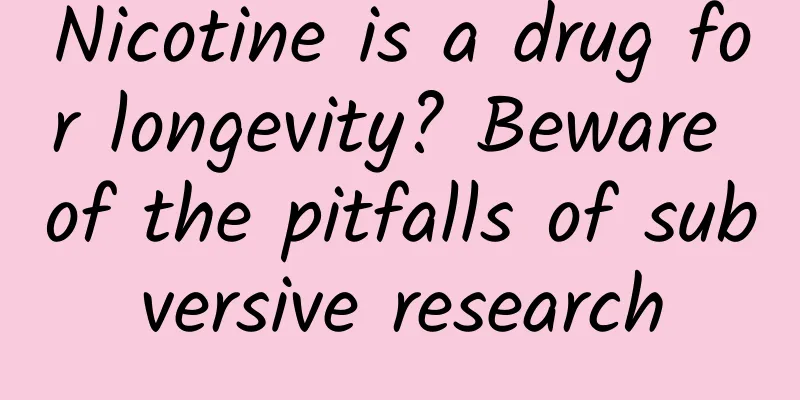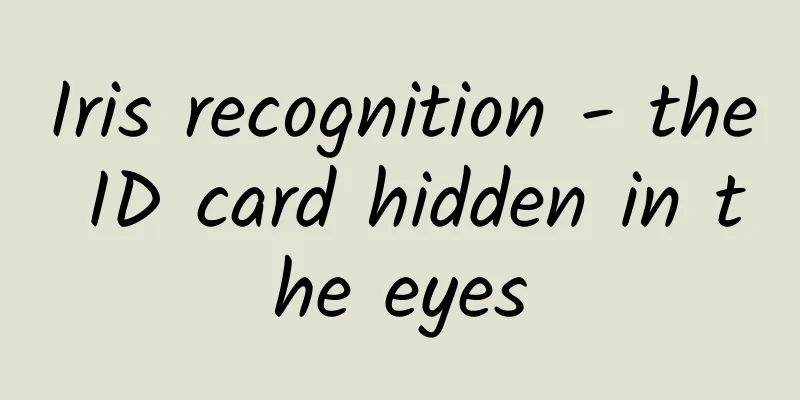Nicotine is a drug for longevity? Beware of the pitfalls of subversive research

|
The rise of self-media has shortened the distance between the cutting-edge progress of scientific research and the general public. However, this shortening of the distance has not improved the public's level of scientific understanding, but has instead deepened the existing confusion. Written by Wang Chenguang (PhD in Biology, former professor at Peking Union Medical College) In March this year, a paper written by Li Xiang's team from the Shenzhen Institute of Advanced Technology of the Chinese Academy of Sciences sparked a small climax of discussion on self-media. The conclusion of this paper can be summarized in academic language as follows (readers who are not familiar with academic terms can skip this for now): Nicotine can bind to a molecule in cells called SIRT1, deacetylate NAMPT, improve NAMPT activity, and increase NAD+ synthesis. Through this mechanism, nicotine can stimulate neurogenesis, inhibit neuroinflammation, protect organs from oxidative stress and telomere shortening, improve cellular energy metabolism disorders, and delay age-related degeneration and cognitive decline. To sum it up in plain words, "low doses of nicotine can prolong life." Everyone knows that smoking is harmful, but a new study has found that simply consuming trace amounts of nicotine is actually beneficial. This seems to mean that taking a few puffs of e-cigarettes or using nicotine patches every day may really help prolong life? Secondly, some plants (especially Solanaceae plants that originally contain toxic ingredients solanine and solanine) naturally contain nicotine. Does this new discovery prove that they are good for health? Around these two "good news", self-media launched self-entertainment, discussion and argument. In stark contrast to the excitement of the self-media, this paper with subversive conclusions has been published for three months, but the scientific community has responded coldly. What is the reason? How should we correctly view this kind of "innovative" research? In my opinion, this incident typically reflects a worrying dilemma: the rise of self-media has shortened the distance between the cutting-edge progress of scientific research and the general public, but this shortening of the distance has not improved the public's level of scientific awareness, but has deepened the existing confusion. Extraordinary claims require extraordinary evidence In fact, the conclusion of Li Xiang's paper is not "alone". For several years, various forums and self-media platforms have been filled with a lot of texts "overturning the verdict" on nicotine, listing the various benefits of nicotine for health and even its ability to treat diseases. For example, previous studies have shown that nicotine can act on the human nervous system, has a certain neuroprotective effect, can improve symptoms of inattention or hyperactivity, and has a certain alleviating effect on neurodegenerative diseases such as Alzheimer's disease and Parkinson's disease; other studies have found that nicotine has a certain anti-inflammatory effect, can inhibit inflammatory reactions and the release of inflammatory factors, and alleviate the symptoms caused by inflammation. These are all basic studies conducted under controlled laboratory conditions, and are not a comprehensive assessment of nicotine. However, these conclusions have been one-sidedly understood by some people, who even attribute all the health hazards of tobacco to other ingredients in tobacco. Even among those who recognize that tobacco is harmful to health, a considerable number of people only agree that it is other ingredients in tobacco, not nicotine, that cause harm, which is also the argument that e-cigarette advocates have long insisted on. Nicotine is not only present in tobacco products, but also appears in other forms, including e-cigarettes, nicotine gum, nicotine patches, etc. The research on whether nicotine can prolong life is carried out based on the understanding of some people. Putting aside for the moment the health hazards of nicotine that have been confirmed by previous studies, let us assume that the results of this article are reliable and the conclusions are valid. Can we improve our health and prolong our life by taking nicotine? Still no. The new conclusion that nicotine can prolong life is based on another old evidence without foundation, that is, β-nicotinamide mononucleotide (NMN) can prolong life. What is the connection between NMN and nicotine? Please go back to the summary of the paper of Li Xiang's team in the first paragraph of this article. NMN is one of the products of the biosynthesis of nicotinamide adenine dinucleotide (NAD+) catalyzed by nicotinamide phosphoribosyltransferase (NAMPT). The assertion that NMN can prolong life comes from a study led by Dr. David Sinclair of Harvard University ten years ago, in which his research team reported that NMN can extend the lifespan of mice. In a blink of an eye, various edible products containing NMN ingredients have entered the market as "longevity drugs" on domestic and foreign websites, and their high-end attitude has won over a group of devout people who dream of immortality. But a careful analysis of the evidence shows that all of Sinclair's NMN studies on life extension were conducted on non-human subjects such as mice and nematodes. Although Dr. Sinclair's conclusions have once again sparked people's expectations for longevity and have led to actions for it (buying various longevity products launched by Dr. Sinclair in the name of Harvard University), the scientific community has been indifferent to this, and many scientists have even publicly expressed their opposition. Dr. Felipe Sierra, director of the Department of Aging Biology at the National Institute on Aging of the National Institutes of Health (NIH), commented on this: "The bottom line is I don't try any of these things. Why don't I? Because I'm not a mouse." There is a principle in scientific research, that is, "extraordinary claims require extraordinary evidence." Whether it is NMN or nicotine, to determine whether it can really prolong life, more powerful evidence is obviously needed. The corresponding fact is that the scientific community has already had sufficient solid research evidence to prove that nicotine itself is a toxic substance that is harmful to health. Whether it is ingested through tobacco or other forms, it has a certain degree of toxicity. The first is its addictive nature. Nicotine is a highly addictive substance that causes physical and psychological dependence, whether consumed through smoking or other routes. Nicotine addiction makes quitting difficult and may cause withdrawal symptoms. Secondly, nicotine affects the central nervous system and is a stimulant. Short-term use can enhance attention and memory, increase psychological excitement and alertness. However, long-term and excessive use of nicotine can lead to poisoning symptoms such as dizziness, headache, nausea, vomiting, muscle cramps and difficulty breathing. Third, nicotine can cause vasoconstriction and increased heart rate, increasing the burden on the heart, leading to increased blood pressure and increased risk of cardiovascular disease. Excessive nicotine intake can also cause digestive system problems such as nausea, vomiting, abdominal pain and diarrhea. There is also evidence that nicotine is a carcinogen, although the risk of cancer from consuming nicotine in non-tobacco forms is lower than from smoking. When faced with new medical research, we need to “let the bullet fly for a while” As soon as the new study on "Low-dose nicotine prolongs life" appeared, many friends forwarded it to the author and asked about its authenticity and credibility. In an interview with the media, Professor Li Xiang, the corresponding author of the paper, gave advice on "eating" based on his research: "Don't reject eating Solanaceae plants. You can eat some tomatoes, peppers, potatoes, eggplants, etc." Professor Li Xiang must have regarded these vegetables containing nicotine as a good food supplement that can prolong life. Behind the advice, it is obvious that he fully believes that the conclusions his team obtained in cell and mouse studies are also applicable to humans. It is irresponsible to extend the conclusions of a non-human experiment to humans and give dietary advice. From the perspective of the impact on the public, this is no different from Zhang Wubon's mung bean soup that cures all diseases and Lin Guangchang's sweet potato that fights cancer. So, as ordinary people who are not professionals, how should we understand such research results? Every day, scientific journals around the world publish a large number of new advances and discoveries in life science and medical research, some of which involve health, medical treatment, drug development or clinical progress. These research results are often the source of news reports in the health field. Especially in the era of self-media, many people who care about their own and their family's health often look for information that is beneficial to maintaining health or treating diseases from the published news. However, for ordinary people who do not have professional knowledge, it is very difficult to understand the research content described in a scientific paper and make correct judgments on the results. Therefore, the author does not recommend that ordinary people obtain the latest knowledge about health and medicine from newly published scientific papers. Even if a certain study involves one's own interests (for example, a cancer patient happens to discover the progress in the treatment of his or her cancer), it should be treated with caution, and you can consider consulting relatives and friends with professional backgrounds. If you have a special interest in this and really want to fully understand the latest medical progress of a certain disease, it is recommended to start with understanding scientific papers. Only by understanding the basic knowledge of a field and understanding those professional terms can you correctly understand the content presented in a scientific paper and make a judgment on whether these contents are helpful for health decisions. Unlike the entertainment industry, which often has shocking blockbuster news, scientific research is a gradual process, and there are rarely earth-shattering discoveries and inventions. Even the rapid launch of the new crown mRNA vaccine is the result of 30 years of dedicated research and simultaneous progress in multiple disciplines. Many major scientific discoveries are often not eye-catching at the beginning. This is because, no matter in which field, understanding the content of cutting-edge research itself poses a great challenge to the public. From this, it can even be concluded that the more "blockbuster" research progress that is easy for ordinary people to understand, the less likely it is to withstand scrutiny. It is a long process to transform the latest biomedical advances into clinical diagnosis and treatment. For example, the recently launched respiratory syncytial virus (RSV) vaccine took more than half a century to develop. Even if a promising screening drug is proven to be effective in vitro and in vivo animal experiments, it takes an average of more than 10 years to be clinically marketed. The vast majority of them fail to be marketed after clinical trials, and those that can be marketed are undoubtedly rare. There is an old Chinese saying that a long illness makes a doctor. It is completely understandable that patients and their families would seek the latest research progress in treatment when they are suffering from illness. However, for practical purposes, we cannot encourage people who do not have professional knowledge to seek treatment from the latest research results and change or abandon existing treatment plans. Even though it may look like science, the elixir of life is still a scam Unlike patients and their families who attempt to find treatment methods from new research, some people browse new developments every day to find research results that support their own understanding from the vast number of papers. This has created a strange phenomenon at present. On the one hand, the public tries to find answers to support their own ideas from scientific research, while on the other hand, they spare no effort to attack and discredit scientific progress that does not conform to their own views. When this kind of thinking is accepted by some so-called scientists, it may endanger society: using scientific methods to piece together evidence to support traditional concepts, such as the "monarch, minister, assistant and messenger" compatibility principle to guide modern drug development; ignoring the contribution of modern medicine to human health, but emphasizing integrative medicine centered on alternative therapies; talking about the philosophical concepts of medicine, and even falsifying to support research conclusions that conform to their "philosophical thinking." When this kind of thinking is reflected in ordinary people, it may bring direct economic losses and physical harm. When a dieter obsessed with weight loss sees a way to lose weight by eating, when a new cancer treatment is discovered after trying various treatments, when a smoker who is struggling with the withdrawal reaction of quitting smoking sees a paper saying that a certain originally harmful ingredient in tobacco is good for health, when an alcoholic finds a research paper supporting that a certain alcohol can protect the liver... these "demands" have created one market after another, and at the same time created anxiety for this group. "Longevity drugs" are the most typical example. In recent years, there have been an endless stream of miracle drugs that claim to prolong life, some of which are endorsed by world-class research institutions and international celebrities, and there is no shortage of fanatical followers. In addition to NMN, miracle drugs such as resveratrol and metformin have also appeared one after another. People are looking for "good prescriptions" for prolonging life in a vast number of papers. Regardless of whether these research results come from nematodes, fruit flies or mice (as experimental subjects), as long as they can prolong life, there will be no shortage of courageous people who try them. However, the reality is contrary to expectations. These miracle drugs and good prescriptions have dug one pit after another without exception, causing believers to jump from one pit to another. The truth is that all these "miracle drugs" have no rigorous scientific evidence to support that taking them can improve vital signs (become younger) except for the personal testimony of the inventors. Even if it is a personal testimony, the standard for becoming younger can be set by oneself. Just like Dr. Sinclair, who advocates that NMN can prolong life, while vigorously promoting NMN products, he also set his own standards and developed an application that can detect a person's "healthy age". Another aspect of the same problem is that things that have been proven to be harmful to health are deliberately concealed, and even their positive effects on health are discovered. For example, a certain type of alcohol can protect the liver and pancreas, reduce the incidence of liver cancer, or help lower blood sugar. Such results are even published in academic journals. An academician of the Chinese Academy of Engineering also proposed an amazing theory that adding drugs to tobacco and letting patients smoke it will allow the smoke to reach the chest and lungs directly, treat lung diseases, and be absorbed by blood vessels to reach the whole body. It is true that the ultimate goal of scientific research is to solve real problems; the ultimate goal of medical science is to make progress in the prevention and treatment of diseases, etiology and pathogenesis, and thus improve people's health and quality of life. However, for any researcher, all he or she can do is to accumulate evidence through rigorous observation, experimentation and analysis to verify or disprove a hypothesis or theory; to get specific results from the laboratory to the clinic, a wide gap needs to be overcome, which is often not something that individual researchers can accomplish independently. References 1. Yang L., et al. Nicotine rebalances NAD+ homeostasis and improves aging-related symptoms in male mice by enhancing NAMPT activity. Nat Commun. 2023 Feb 17;14(1):900. 2. Benowitz NL. Pharmacology of nicotine: addiction, smoking-induced disease, and therapeutics. Annu Rev Pharmacol Toxicol. 2009;49:57-71 3. Siqueira LM; COMMITTEE ON SUBSTANCE USE AND PREVENTION. Nicotine and Tobacco as Substances of Abuse in Children and Adolescents. Pediatrics. 2017 Jan;139(1) 4. "Nicotine and Health" (2014) - Surgeon General's Report Reviewer: Li Changqing Scientific rumor refutation x Fanpu joint production Special Tips 1. Go to the "Featured Column" at the bottom of the menu of the "Fanpu" WeChat public account to read a series of popular science articles on different topics. 2. Fanpu provides a function to search articles by month. Follow the official account and reply with the four-digit year + month, such as "1903", to get the article index for March 2019, and so on. Copyright statement: Personal forwarding is welcome. Any form of media or organization is not allowed to reprint or excerpt without authorization. For reprint authorization, please contact the backstage of the "Fanpu" WeChat public account. |
<<: Why do clothes that are dried in the shade smell so bad? The reason is...
Recommend
If you see a numbered butterfly, post it online immediately!
This year, Guangzhou has experienced the longest ...
Huawei is the first to implement local natural language image search function on mobile phones
We are used to search engines, but we are often h...
Alfa Romeo Stelvio has been declared as a competitor to Macan
When it comes to Alfa Romeo, everyone will think ...
How to promote on Bilibili?
Bilibili , a video content community that started...
Understand brand communication and marketing in 3 sentences!
This tweet starts off by talking about disseminat...
iPhone 6s sold less than OPPO last year. How can Apple save itself in China?
Since 2012, the iPhone has been the sales champio...
Ah? Music can actually heal injuries!
In order to ensure the popularization effect of l...
Plastic waste found in the Mariana Trench, human waste also found at the bottom of the ocean
In fact, this is not the first time that the scie...
"91 Ten Articles" - A daily must-read briefing for the new energy vehicle industry (210311)
1. Wuling Motors officially announced that actors...
The beginning of the "fall" of the giant Sony after the marriage with Xiaomi
Although the domestic TV market has been dominate...
Practical tips: How to increase followers on Douyin?
Recently, some people have been asking, “Why is T...
Apple Pay Development Guide and Human Interface Guide
I translated two articles at work and learned mor...
I didn’t spend a penny on promotion and achieved 23 million app downloads!
The author of this article spent 6 hours to creat...
Snowflakes are all hexagonal, and each one is unique. Why? | Xian Shuo Ba Dao
The phenomenon of water freezing at 0°C that you ...
Porsche Mission E may be equipped with a new battery pack
According to foreign media reports, Porsche showe...









